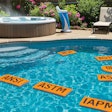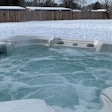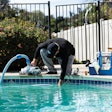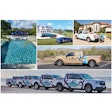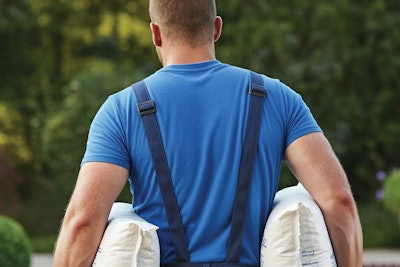
I feel like the old Indian Chief in the movie Little Big Man, talking to Dustin Hoffman in this one: “Today is not a good day to die.”
When I say “die” in this instance, I mean “kill your body with bad ergonomic work habits and improper pool service techniques either immediately or over time.”
I’m going well beyond the “lift with your knees and drink plenty of water” mantra today. This will be real talk, and I hope what I say doesn’t fall on deaf ears because many of the “old folks” you know from our industry only look old because of how they treated their bodies over a career in pool service.
I recall when calcium hypochlorite came in 100-pound cardboard containers with a big metal ring around the top. I used to throw one on each shoulder, carrying 200 pounds in a single trip for a customer. The old-timers warned me, “You’re gonna hurt yourself.” I thought I was invincible, but the truth is, their warnings were correct. (The funny thing about those cardboard barrels: If the product was old, your hand would go right through it when you tried to lift one.)
You might feel indestructible now, but take it from me — the decisions you make today can have long-term consequences. You’ll wake up one day, and getting out of bed will be more difficult. It will be trickier to get in the truck. Cold weather will start to hurt your hands. This is where you are heading if you believe you’re 10 feet tall and bulletproof.
Our work is physically demanding, but it doesn’t have to ruin our health. Consider how you use your body daily. The items we carry, how we move, and the repetitive actions all contribute to injuries. Hand trucks exist for a reason, and asking for help is okay. Lift with your legs, not your back. Oops, there it is! Put on sunblock and drink more water — it’s advice we hear often, but do we always follow it?
Think about the simple act of carrying a wallet in your back pocket when driving. Chiropractors warn against it because it shifts your hips and can cause long-term lower back problems. So put that thing in your front pocket and be mindful of your actions to prevent injuries. One key piece of advice: become ambidextrous.
Switch up how you clean pools. If you always net the pool with your right hand, try using your left. Alternate your movements to balance the strain on your body. I don’t mean back and forth as you do a single pool, but how about you switch it up from pool to pool? This concept might sound odd or awkward initially, but think about the gym-goer who only works on his upper body and neglects his legs — he looks like a lightbulb. You’re doing the same thing by consistently cleaning pools from the same body position — overworking muscles on one side of your body while neglecting those on the other. Think symmetry.
Before heading out to the field, take a minute and stretch. I’m not talking about when you reach out from under the covers and stretch for the alarm to hit snooze. I mean before you get after it in the morning, take a moment and slowly reach for the sky, and touch your toes. I cheat a bit by going to a place called Stretch Zone, which is a combination of forced yoga and sports rehab. It helps me stretch beyond what I can on my own and the right way.
Adding an exercise routine is another key to resilience and keeping up with the grind. Don’t be one of those who thinks it’s not needed because “I get enough exercise cleaning pools.” Consider building your core. In the army, we called it “front leaning rest” position, but PT people call it plank — I saw in Men’s Health Magazine once that the average man should be able to hold that position correctly for two minutes. Add in some push-ups, some pull-ups, some chin-ups. And nutrition? Absolutely vital.
I started tracking my steps and found out I was clocking in around 13 miles daily while servicing pools. Over an 8-hour shift, we’re all competing daily in a half marathon. This kind of physical demand means you’ve got to prepare yourself properly every day. Talk to a trainer. Getting professional guidance to tailor a fitness and nutrition plan that works for you and your unique needs is essential.
Our work is challenging, but you don’t need to sacrifice your health. Learn from the mistakes and the experiences of those around you. Make smarter choices today for a healthier tomorrow.
When you’re young and strong, the last thing on your mind is how your actions today will affect your health tomorrow. But trust me, the pain and discomfort that comes with years of physical labor can sneak up on you. Carrying those bags of salt two and three at a time without proper equipment or assistance might seem like a testament to your strength now, but it will wear your body down over time. I’ve seen too many of my peers suffer because they didn’t heed the advice from salty old Ben Kenobi-looking pool pros.
Skin cancer is another serious concern in our line of work. Spending countless hours under the sun without adequate protection can lead to severe consequences. I was once like you, shrugging off the advice about sunblock. I was good at putting it on in the morning, but I absolutely sucked at reapplying it throughout the day.
Now, I visit the dermatologist’s office once a year. It’s not a pleasant experience. I’ve had basal cell carcinoma a few times, and while it’s considered the least dangerous type of skin cancer, it’s still cancer. I have scars to remind me of the price I paid for not taking sun protection seriously. Some of my colleagues have had it worse with melanoma, a more aggressive form of skin cancer. They’ve had surgeries and now live with the constant fear of recurrence.
I’ve had numerous conversations with many different people about skin cancer, and some seem to think I’m exaggerating. But let me tell you the harsh truth: Skin cancer is real, it’s deadly, and it can happen to anyone. Bob Marley, the most famous person whose pool I ever cleaned, died from skin cancer. I also lost my father to melanoma, so this issue is deeply personal to me. Maybe that’s why it is even more terrifying when they find spots on me. I’m emphasizing this so you do it the right way and learn from me being a total idiot so they don’t find cancer spots on you.
I share this with you not to garner sympathy but to serve as a cautionary tale. My experience is a testament to the importance of caring for your body. Don’t be a dumbass, listen to the advice of those who have been in the industry longer. They speak from experience and are trying to save you pain and discomfort.
Another point to consider is the type of vehicle you use. Smaller vehicles like the Nissan Frontier or Ford Ranger are easier to work with because they’re lower to the ground. However, if you use a taller truck, you might have a more challenging time lifting equipment over the sides, one that your back will scream about at some point down the road. Doesn’t mean you can’t use an F-150, but have a plan for getting heavy stuff up there other than just “HEAVE!”
I know you might be thinking, “Is this advice coming from the guy with the cane?” Yes it is, and that’s exactly why you should take my recommendations seriously. I’ve been there — I got hurt, did the research, spoke with trainers, and then implemented changes, but after the fact. I either didn’t know or didn’t listen. Be proactive in taking care of your body — be better than me.
This article first appeared in the September 2024 issue of AQUA Magazine — the top resource for retailers, builders and service pros in the pool and spa industry. Subscriptions to the print magazine are free to all industry professionals. Click here to subscribe.







































